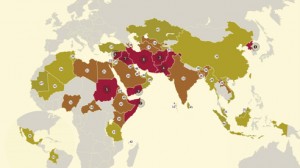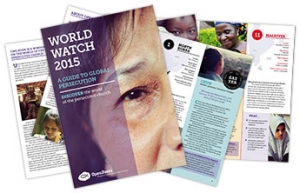Displaying items by tag: world watch list
WORLD WATCH LIST - Global trends in 2019
Open Doors latest report brings much sobering reading, but also a few positive glimmers.
In Brief:
North Korea (1) tops the World Watch List for the 18th year in a row. Despite its ranking in the top slot it did free three Korean-American Christians from a North Korean prison.
Persecution of Christians is getting worse. Five years ago only one country – North Korea – was ranked in the ‘extreme’ category for its level of persecution of Christians. This year, 11 countries score enough to fit that category.
China (27) has risen 16 places in the list after new Regulations for Religious Affairs came into force in February 2018.
In Myanmar (18) tens of thousands of members of the Karen tribe – a majority-Christian ethnic tribe – have been killed and least 120,000 displaced.
India (10) has entered the top ten for the first time. The BJP-led government continues to promote an extremist militant Hindu agenda.
In Turkey (26) President Recep Tayyip Erdogan has been stirring up ultra-nationalistic sentiment for some time and this has caused added difficulties for Christians in Turkey, especially Evangelicals.
As radical Islam has been forced out of the Middle East, it has spread into sub-Saharan Africa. Almost 30 violent Islamic extremist groups are known to be active in the region.
Islamic militants also have also gained strength in failed states like Somalia (3), Libya (4) and Yemen (8), where they continue to recruit, and capture pockets of territory.
The two places where Christians suffer the most violence are Nigeria (12) and Pakistan (5).
THE WORLD WATCH LIST: THREE MAIN TRENDS
Three major trends have shaped persecution against Christians this year:
Authoritarian states are clamping down and using legal regulations to control religion.
Ultra-nationalists are depicting Christians as ‘alien’ or ‘western’ and trying to drive them out.
Radical Islam has moved from the Middle East to sub-Saharan Africa.
GOOD NEWS
It’s not all bad news! There is light in the darkness, and the courageous faith of Christians is evident, even in the harshest conditions.
Worldwide: Above all, the World Watch List shows that the church is active and alive. Persecution is rising – but that only happens where the church is actively sharing the gospel and living it out.
Read the full report and download resources from the Open Doors Website Here: https://www.opendoorsuk.org/persecution/trends/
Pray: Lets continue to be in prayer for the estimated 245 million people worldwide who are persecuted for their Christian faith.
Pray: For those who are in prison, detention or separation from their families, due to their faith.
Pray: For the estimated 11 people a day who are martyred for being a Christian – and for their families and loved ones. (Rev 2:10)
Pray: For strength and encouragement for the Church of Christ – that it will continue to grow and flourish despite the persecution.
Gender-based violence against Christians
Afghanistan, Libya, North Korea, Pakistan, and Somalia are the five worst places for women to live, according to the 2019 World Watch List of ‘50 most difficult places to be a Christian’. The list reports that, in contexts which restrict women’s legal rights to equal representation, minority Christian communities are especially vulnerable to having their women and girls sexually attacked, forcibly married, subjected to domestic abuse, stripped of their inheritance, or even killed - all with impunity. Sexual violence is used as a means of power and control against Christian women. Discrimination based on stereotypical roles of men and women is one of the most widespread human rights violations worldwide. It can assume cruel forms and deprives many women and girls of their rights to life, freedom, and respect for human dignity. In Afghanistan, ‘women found to be married to new converts from Islam and sharing their husbands’ Christian faith, are punished by being raped. The same happens with children of converts who are at risk of child abuse.’
Global: Christian persecution rising
Figures for the persecution of Christians have shown a 'shocking increase', by 13.9% according to Open Doors World Watch List 2019. Asia has a sharp rise. China rose 16 places to number 27, with new laws to control all expressions of religion. Some church leaders say it is the worst since the Cultural Revolution ended in 1976. India, the world's largest democracy, is now number 10 on the list. Hindu extremists act with impunity, violently attacking Christians and churches and non-Hindu religious minorities. Rising nationalism is leading to persecution in Bhutan, Myanmar and Nepal, where national identity is tied to religion and those from minority faiths are considered outcasts. Persecution in North Korea has been worse than any other country for the last 18 years. In the north and middle of Nigeria, 3,700 Christians were killed for their faith - almost twice as many as the previous year.
‘Worst Year Yet’: Open Doors Report
The Top 50 Countries Where It’s Hardest to Be a Christian;Islamic extremism now has a rival, according to the 2017 World Watch List
For the third year in a row, the modern persecution of Christians worldwide has hit another record high.
But the primary cause, Islamic extremism, now has a rival: ethnic nationalism.
Thus, Asia increasingly merits concern alongside the Middle East, according to the 2017 World Watch List (WWL) released today by Open Doors.This being the list’s 25th anniversary, Open Doors also released an analysis of persecution trends over the past quarter-century.The annual list examines the pressures faced by Christians in five spheres of life (private, family, community, national, and church), plus levels of religiously motivated violence, in order to rank the top 50 countries where "Christians face the most persecution." [Full list below.]
Christianity Today’s coverage of recent WWL rankings noted how North Korea was getting competition, as well as how the annual list aims for effective anger and shows persecuted believers that they are not forgotten.
In 25 years of “chronicling and ranking” the political and societal restrictions on religious freedom experienced by Christians worldwide, Open Doors researchers identified 2016 as the “worst year yet.”
“Persecution rose globally again for the third year in a row, indicating how volatile the situation has become,” stated Open Doors. “Countries in South and Southeast Asia rapidly rose to unprecedented levels and now rank among such violent areas as the Middle East and Sub-Saharan Africa.”
The findings and trends noted by Open Doors are stark:
- Approximately 215 million Christians experience high, very high, or extreme persecution.
- North Korea remains the most dangerous place to be a Christian (for 14 straight years).
- Islamic extremism remains the global dominant driver of persecution, responsible for initiating oppression and conflict in 35 out of the 50 countries on the 2017 list.
- Ethnic nationalism is fast becoming a major driver of persecution. “While this took an anti-establishment form in the West, in Asia it took an anti-minorities form, fueled by dramatic religious nationalism and government insecurity. It is common—and easy—for tottering governments to gain quick support by scapegoating Christians.”
- The total number of persecution incidents in the top 50 most dangerous countries increased, revealing the persecution of Christians worldwide as a rising trend.
- The most violent: Pakistan, which rose to No. 4 on the list for a level of violence “exceeding even northern Nigeria.”
- The killings of Christians in Nigeria saw an increase of more than 62 percent.
- The killings of Christians were more geographically dispersed than in most time periods studied. “Hitting closer to home, 23 Christian leaders in Mexico and four in Colombia were killed specifically for their faith,” said Open Doors of the “rare” event.
- The worst increase: Mali, which moved up the most places on the list from No. 44 to No. 32.
Asia is a new center of concern, with persecution rising sharply in Bangladesh, Laos, and Bhutan, and Sri Lanka joining the list for the first time.

Open Doors noted that India rose to its highest rank ever, No. 15, amid the continued rise of Hindu nationalism. “An average of 40 incidents were reported per month, including pastors beaten, churches burned and Christians harassed,” stated Open Doors. “Of the 64 million Christians in India, approximately 39 million experience direct persecution.”
In Central Asia, persecution spread due to both Islamic extremism and government attempts to restrict it. “In many countries, governmental raids of suspected Christian households increased, certain Christian books have been banned,” stated Open Doors, “and the membership requirement to remain a legal church doubled, resulting in many churches to be deemed illegal overnight.”
The top 10 nations where it is most dangerous and difficult to practice the Christian faith are:
- North Korea
- Somalia
- Afghanistan
- Pakistan
- Sudan
- Syria
- Iraq
- Iran
- Yemen
10 Eritrea
Yemen was the only new country in the top 10, replacing Libya.
Over the past 25 years, only three countries have topped the list: North Korea (2002 – 2017), Saudi Arabia (1993 – 1995; 1998 – 2001), and Somalia (1996 – 1997).
The top 10 nations over the 25-year span are:
- North Korea
- Saudi Arabia
- Iran
- Somalia
- Afghanistan
- Maldives
- Yemen
- Sudan
- Vietnam
10.China
Six countries appear on both lists—a sign of the concerning stability of persecution, noted Open Doors.The WWL data is compiled from reports spanning November 1, 2015, to October 31, 2016. The annual list is audited by the International Institute for Religious Freedom.Open Doors defines persecution as “any hostility experienced as a result of identification with Christ.” “Christians remain one of the most persecuted religious groups in the world,” it stated. “Christians throughout the world continue to risk imprisonment, loss of home and assets, torture, beheadings, rape and even death as a result of their faith.”
“The Open Doors World Watch List is the most accurate, thorough and intensive research available on the persecution of Christians,” said David Curry, president and CEO of Open Doors USA. “It calculates not only deaths reported in the news, but also persecution at a grassroots level, where family-to-family persecution is tracked. The 25-year research shows where the most unstable areas for Christians have historically been and, in many countries, remain.”
Christianity Today previously reported the WWL rankings for 2016, 2015, 2014, 2013, and 2012, including a spotlight on where it's hardest to believe. CT also recently compiled 2016’s 12 most-read stories of the persecuted church.
https://twitter.com/CTMagazine
Pray: Please remember to keep the over 200 million fellow believers living in areas of high or extreme persecution in your regular prayers that they will be encouraged in their faith and victorious.
Pray: that the Gospel will powerfully flow through their lives and words to those around them, resulting in the conversion of even their harshest persecutors.
215 Million Christians Persecuted, Mostly by Muslims
by Raymond Ibrahim January 21, 2018 at 5:00 am
https://www.gatestoneinstitute.org/11775/persecuted-christians-open-doors
In short, the overwhelming majority of persecution that these 215 million Christians experience around the world — especially the worst forms, such as rape and murder — occurs at the hands of Muslims.
If time is on the side of Christians living under Communist regimes, it is not on the side of Christians living under Islam. The center of the great Christian Byzantine Empire is now an increasingly intolerant, rapidly Islamizing Turkey. Carthage, once a bastion of Christianity — where one of Christendom's greatest theologians, St. Augustine, was born and where the New Testament canon was confirmed in 397 — is today 99% Muslim-majority Tunisia.
As what began in the seventh century comes closer to fruition and the entire world becomes more Islamic and "infidel" free, as in Iraq, confronting these uncomfortable facts is at least a welcome first step in countering the problem.
"215 million Christians experience high levels of persecution" around the world, according to Open Doors, a human rights organization. On its recently released World Watch List 2018, which ranks the world's 50 worst nations wherein to be Christian, 3,066 Christians were killed, 1,252 abducted, and 1,020 raped or sexually harassed on account of their faith; and 793 churches were attacked or destroyed.
The Islamic world had the lion's share of this persecution; 38 of the 50 worst nations are Muslim-majority. The report further cites "Islamic oppression" behind the "extreme persecution" that prevails in eight of the 10 worst nations. In short, the overwhelming majority of persecution that these 215 million Christians experience around the world — especially the worst forms, such as rape and murder — occurs at the hands of Muslims.
These Muslims come from all walks of life and reflect a variety of races, nationalities, languages, socio-economic and political circumstances. They include Muslims from among America's closest allies (Saudi Arabia #12 worst persecutor) and Muslims from its opponents (Iran #10); Muslims from rich nations (Qatar #27 and Kuwait #34) and Muslims from poor nations (Afghanistan #2, Somalia #3, and Yemen #9); Muslims from widely recognized "radical" nations (Pakistan #5), and Muslims from "moderate" nations (Malaysia #23 and Indonesia #38).
But if the World Watch List ranks North Korea — non-Islamic, communist — as the number one worst persecutor of Christians, why belabor the religious identity of Muslims? Surely North Korea's top spot suggests that Christian persecution is not intrinsic to the Islamic world but is rather a byproduct of repressive regimes and other socio-economic factors that proliferate throughout the Muslim world?
There are some important distinctions that need to be made. While Christians are indeed experiencing a "life of hell" in North Korea, overthrowing Kim Jong-un's regime could not only lead to a quick halt to this persecution but also to a rise of Christianity — as has happened recently in Russia. Under the Soviet Union, between 12 and 25 million Christians were killed for their faith[1], and approximately 153,000 churches were shut down.[2] Since the fall of the Soviet Union in 1991, about a thousand churches have been (re)built every year, and, according to a 2014 Pew report, between 1991 and 2008, Russians identifying themselves as Orthodox Christian rose from 31% to 72%. That "South Korea is so distinctively Christian" reflects what could be in store — and creating fear for — its northern counterpart.
In the Islamic world, the fall of dictatorial regimes rarely seems to alleviate the sufferings of Christians. On the contrary, when secular dictators fall — Saddam in Iraq, Qaddafi in Libya, and attempts against Assad in Syria — persecution of Christian seems to rise as a grassroots byproduct. Today, Iraq is the eighth worst nation in the world in which to be Christian, Syria is fifteenth, and Libya seventh. Under dictators, these countries were significantly safer for religious minorities.
A militiaman from the Nineveh Plain Protection Units (NPU) walks through a destroyed church on November 8, 2016 in Qaraqosh, Iraq. The NPU is a militia made up of Assyrian Christians that was formed in late 2014 to defend against ISIS. Qaraqosh is a mostly Assyrian city near of Mosul that was captured by ISIS in August 2014, and liberated in November 2016. (Photo by Chris McGrath/Getty Images)
Similarly, the only countries that were part of the former Soviet Union that still persecute Christians are, rather tellingly, the Muslim-majority ones of Central Asia. These include Uzbekistan (#16 worst persecutor), Turkmenistan (#19), Tajikistan (#22), Kazakhstan (#28) and Azerbaijan (#45).[3]
The "extreme persecution" of Christians throughout the Muslim world is part of a continuum begun nearly fourteen hundred years ago. The same patterns of persecution are still prevalent — including attacks for blasphemy and apostasy, restrictions and attacks on churches, and a general contempt for — followed by the vile treatment of — "subhuman infidels."
Unlike the persecution of Christians in Communist nations, rooted to a particular regime, Muslim persecution of Christians is perennial, existential, and far transcends any ruler or regime. It unfortunately seems part and parcel of the history, doctrines, and socio-political makeup of Islam — hence its tenacity and ubiquity. It is a "tradition."
That those persecuting Christians come from a wide variety of racial, linguistic, cultural, and socio-economic backgrounds — from African, Arab, Asian, and Caucasian nations — and share little in common with one another, except for Islam, sadly only further underscores the true source of the persecution.
If time is on the side of Christians living under Communist regimes, it is not on the side of Christians living under Islam. The center of the great Christian Byzantine Empire is now an increasingly intolerant, Islamizing Turkey. Carthage, once a bastion of Christianity — where one of Christendom's greatest theologians, St. Augustine, was born and where the New Testament canon was confirmed in 397 — is today 99% Muslim-majority Tunisia. Centuries of persecution and forcing non-Muslims to live as barely-tolerated third-class residents are responsible for the demographic shift that Tunisia and other formerly non-Muslim nations are experiencing.
Long after North Korea's Kim Jong-un has gone, tens of millions of Christians and other "infidels" will still suffer persecution. As what began in the seventh century comes closer to fruition and the entire world becomes more Islamic and "infidel" free, as in Iraq, confronting these uncomfortable facts is at least a welcome first step in countering the problem.
Raymond Ibrahim is the author of Crucified Again: Exposing Islam's New War on Christians (published by Regnery with Gatestone Institute, April 2013).
[1] James M. Nelson, Psychology, Religion, and Spirituality, 2009, p. 427.
[2] Paul Froese, "Forced Secularization in Soviet Russia: Why an Atheistic Monopoly Failed," Journal for the Scientific Study of Religion, Volume 43, Number 1, March 2004, p. 42
[3] While Open Doors ascribes the persecution of Christians in these five nations to "Dictatorial Paranoia," considering that they are all overwhelmingly Muslim majority, it seems reasonable to conclude that Islam is at least partially responsible. Open Doors itself notes that "There is a grassroots revival of Islam in Central Asia, and that means more pressure from the nationalist pro-Islamic governments and within society—causing increased persecution levels on two fronts."
The 50 worst places on Earth for Christians
'They will just execute somebody who commits their life to faith'
http://www.wnd.com/2018/01/the-50-worst-places-on-earth-for-christians/
215,000,000 Christians Persecuted, Mostly by Muslims
https://www.gatestoneinstitute.org/11775/persecuted-christians-open-doors
World Watch List
The Open Doors World Watch List highlights the 50 countries where it is most difficult to live as a Christian.
The most rigorous and detailed report of its kind, the World Watch List uses data from Open Doors field workers and independent experts to track the deep structures of persecution, measuring the degree of freedom Christians have to live out their faith in five spheres of life – private, family, community, national and church life.
Using the World Watch List, Open Doors has produced a range of resources to inspire committed prayer and action on behalf of persecuted Christians around the world.





